Will Emily be allowed to keep her baby?
- Published
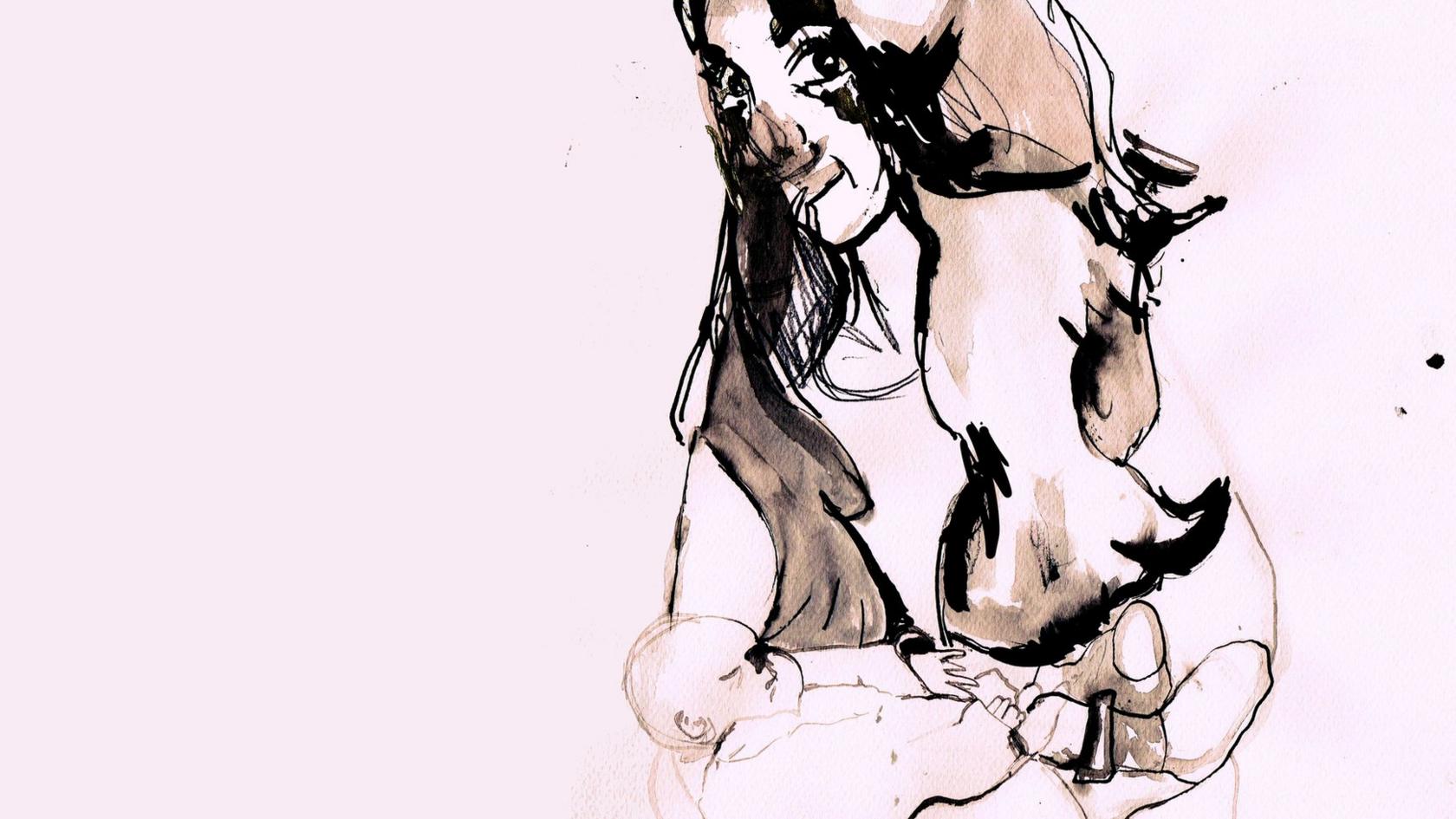
When a mother has a child taken from her by the courts and social services the chances are that her next baby will be removed as well - in the baby's own interests. But social workers may give the mother and her partner a chance to show that the new child will be safe in their hands.
"I hated myself. I was an absolute mess. I wasn't capable of raising children. I physically and emotionally could not look after nine children by myself any longer."
This is Emily's verdict on herself, at the moment when she was at her lowest ebb. Following a court decision, social workers had just removed all nine of her children for their own safety. Emily was alone.
"I had no emotion, no feeling whatsoever. It was like walking around in a daze, all the time, spaced out. I started going out, drinking a lot. It was a way to block it out."
But 18 months later Emily was pregnant again.
At just 31 years old, she is about to have her 10th baby.
This is her story.
Will Emily be allowed to keep her baby?
June 2019
For me the story begins in June 2019, in a glass-walled conference room at Hertfordshire County Council. Some hyper-keen, idealistic trainees are holding a meeting with their consultant social worker from the charity, Frontline.
Frontline runs a fast-track training scheme for graduate social workers and these young people are all less than a year into their on-the-job training, not yet fully qualified as social workers, but able to take on a small number of real cases, with an experienced consultant social worker providing support and holding the legal responsibility.
They swap stories about their work, debate dilemmas that they have faced, and shoot off theories about what might be really going on, below the surface, in the complex lives of their clients.
They draw diagrams on big sheets of paper, which look like family trees but have broken lines showing broken relationships, and notes about the domestic violence, drug and alcohol abuse which scar these lives.
One of the trainees, Jemima Ferguson, mentions a nine-year-old girl who's told teachers that her mother has been abusing her. Another, Joe Grabiner, describes the work he's doing with a teenager from a broken home who's had a baby girl.
But it's James Shutkever's case that grabs my attention - he's talking about Emily, who has just given birth.
In 2017 the Family Court ordered that all nine of her older children should be removed from her care because of severe neglect, James explains. Three of the younger children were adopted, and the other children are in long-term foster care.
What will happen now to her 10th baby, a little boy?

Find out more
This story is a 20-minute read
You can also listen to Andrew Bomford's 10 weekly reports for the PM programme on BBC Radio 4

With a record like that, some social workers would have tried to persuade a judge that the baby should be removed at birth. But James, and some senior Hertfordshire social workers, feel strongly that she should be given another chance.
To protect the identity of the baby I'm going to give everyone in the family different names. I'm calling the baby Harry, and his mother Emily. The baby's father, Emily's partner, is Alex.
"What's your dilemma?" consultant social worker Rebecca Taylor, asks James.
"How can I build this family's trust in me?" James replies.
"Do you think they trust you at the moment?"
"No," he admits.
"I think it's a natural thing with parents when children's services become involved in their lives, that they see us as something negative - that we're there to catch parents out, and take children away from them.
"I want to change that narrative, and help them see that I'm actually there to support them, and prevent that from happening."
Emily suffered severe domestic violence at the hands of her previous partner, the father of all her other children. After the relationship collapsed, she was left to bring up the children alone, and as she herself says, she couldn't cope.
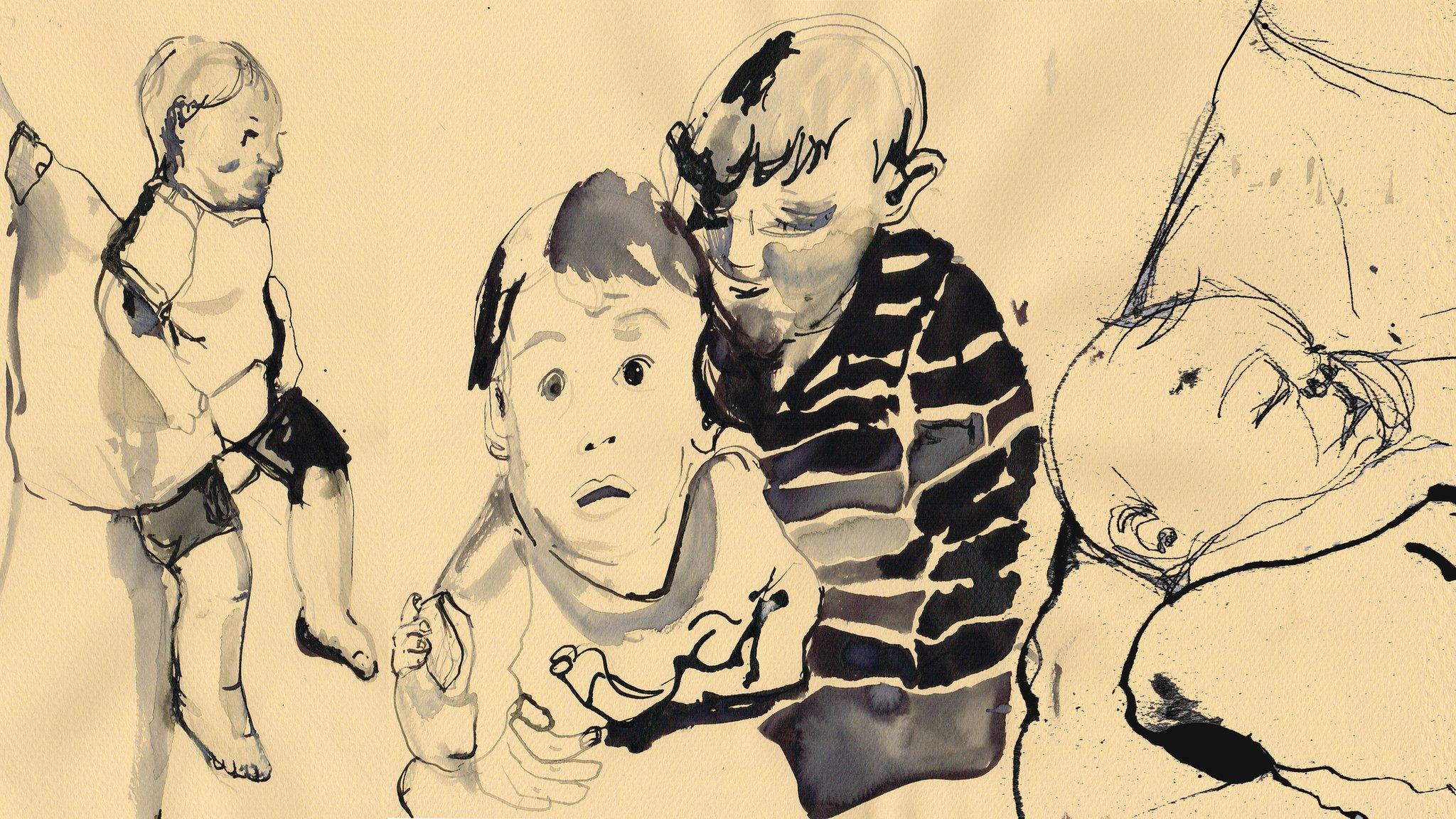
According to Brenda Greig, a senior Hertfordshire social worker known as a service manager, the children's clothes were not kept clean, they were poorly fed and their medical needs were not attended to. They didn't always go to school, were often left unsupervised and were regularly seen fighting with each other.
"It's understandable that having nine children is not an easy task, and for any parent it would be a challenge," she adds. "But the concern was that Emily did not engage in the support offered. The matter was eventually taken to court, and the decision was made by the court that it was not safe for the children to remain in Emily's care, and all nine children were removed from her care."
July 2019
James and a consultant social worker are visiting Emily and her baby Harry, who is now four weeks old.
What's changed? I wonder. Why are they now prepared to work with her to see whether she is capable of looking after this child, after such a disaster before?
"I think the obvious thing is a big change in what is expected of her," says James.
There's a big difference between looking after nine children and looking after one, he points out.
"But also I think she's had a really big change in mindset, and her mental health has become a lot more stable.
"And she's also moved away from a really abusive relationship which only disempowered her more, into what she sees at least as being a more mutual relationship, in which there's a much better share of power and control."
First impressions of Emily are that she is a vibrant, funny and strong-willed woman, devoted to her new baby.
James asks her how she has changed since her children were taken from her in 2017.
"In 2017 I was in a deep depression," says Emily. "I wouldn't have worked with you. Not like I do now. I engage with the professionals now. Before then I didn't. I probably wouldn't have let you in the house or nothing."
The depression was a result of the domestic violence she'd suffered at the hands of her ex-partner, she says.
"I hated it. Hated life - not the kids but myself. Trying to look after nine children when you feel like that... If I couldn't look after myself, how could I look after the kids?"
Her ex didn't help with childcare and didn't provide any financial support, she says.
"Even feeding nine, and bathing nine, and getting them up for school for one person... It was horrendous.
"I hated myself. I was an absolute mess. At that time I wasn't capable of raising children. Now I see the difference I can admit it, I was completely in denial.
"That's why in the end I couldn't, I physically and emotionally could not look after nine kids by myself any longer."
Emily's baby, Harry, is currently under a Child Protection Plan. It's one of the highest forms of support social workers can provide, short of taking the child into care. It means a child is suffering, or is likely to suffer, significant harm.
But for now they are prepared to allow Emily and Alex to bring up their baby, under close supervision. James describes it as a "managed risk".
"You need to take into account what happened in the past, because this is what certain people are capable of doing. But equally people have a right to be assessed as they currently are," he says.
"Let's talk about what happened before, but let's talk about what's happened since then, and the kind of parents you can be now. I think there's always room for people to change. I think everybody has the ability to change."
Emily believes she has changed.
"I'm happy now, settled down, and chilled out. In a better place now," she says. "I'm in a good relationship. We haven't argued for a long time now. Obviously, we have our disagreements because he annoys the hell out of me sometimes. But things have changed massively."
Now she says she doesn't want anything to get in the way of her being a mum to Harry.

September 2019
Over the summer the social workers have continued to make regular visits to see Emily, Alex, and their baby Harry.
Most of the visits are arranged in advance, but they also make regular unannounced visits, sometimes in the evenings or at weekends. It's a way of seeing what is really going on in a family, when they haven't had a chance to prepare.
One evening, on an unannounced visit, Alex was found to be drinking. For the social workers this was a big concern. The parents had promised there would be no alcohol in the flat, because it had been a trigger for fights and arguments between them in the past.
On their files, social workers had noted seven previous incidents of disputes between Emily and Alex, some of them involving the police.
At first, James had tried to get through to Emily and Alex by phone, but when he couldn't succeed he became concerned, and took steps to visit the couple with service manager Brenda Greig.
"It took some time for Emily and Alex to open the door to us, and they seemed very shocked to see us," she recounts. "In our conversation with Alex it became pretty clear that he'd been drinking, although he denied it."
During home visits social workers routinely look around the flat and James found alcohol in the kitchen, at which point Alex admitted it. He had been drinking.
James says the incident worried him: "It made us question what else might be going on in the house that we don't know about."
It led to a series of discussions with Emily and Alex about the need for more openness and honesty. Brenda thinks that the decision not to escalate the matter further did, in the end, improve the relationship between James and the parents.

After a year of on-the-job training with Frontline, James has now qualified as a social worker, and a few days later he visits Emily again, together with his new manager, Garth Taljaard, from Hertfordshire's family safeguarding team.
"He was drunk that one time in here," she says. "And just our luck, you lot turn up, as you do. But he doesn't drink very often. My ex was a drunk, my dad was a drunk. I don't like drunk men."
Garth asks her if she is now being more honest with James.
She says that she has come to trust him, even though at first she was terrified her baby would be taken away.
"I think our relationship has grown. Because I won't lie to you, I hated you lot. I hated you lot completely. But it's been completely turned around."
Despite the setback, Garth agrees that they should continue to give Emily and Alex their support.
11 October 2019
"Sorry for kicking off. I've never been so angry in my life," Emily says to James.
It's the day after a fight between her and her partner Alex, some of it witnessed by social workers.
The parents had been due to attend a meeting with social workers at a council office, when Emily was spotted hitting Alex. He was seen sprawled on the ground in the car park. The argument continued into the building, when social workers had to separate them.
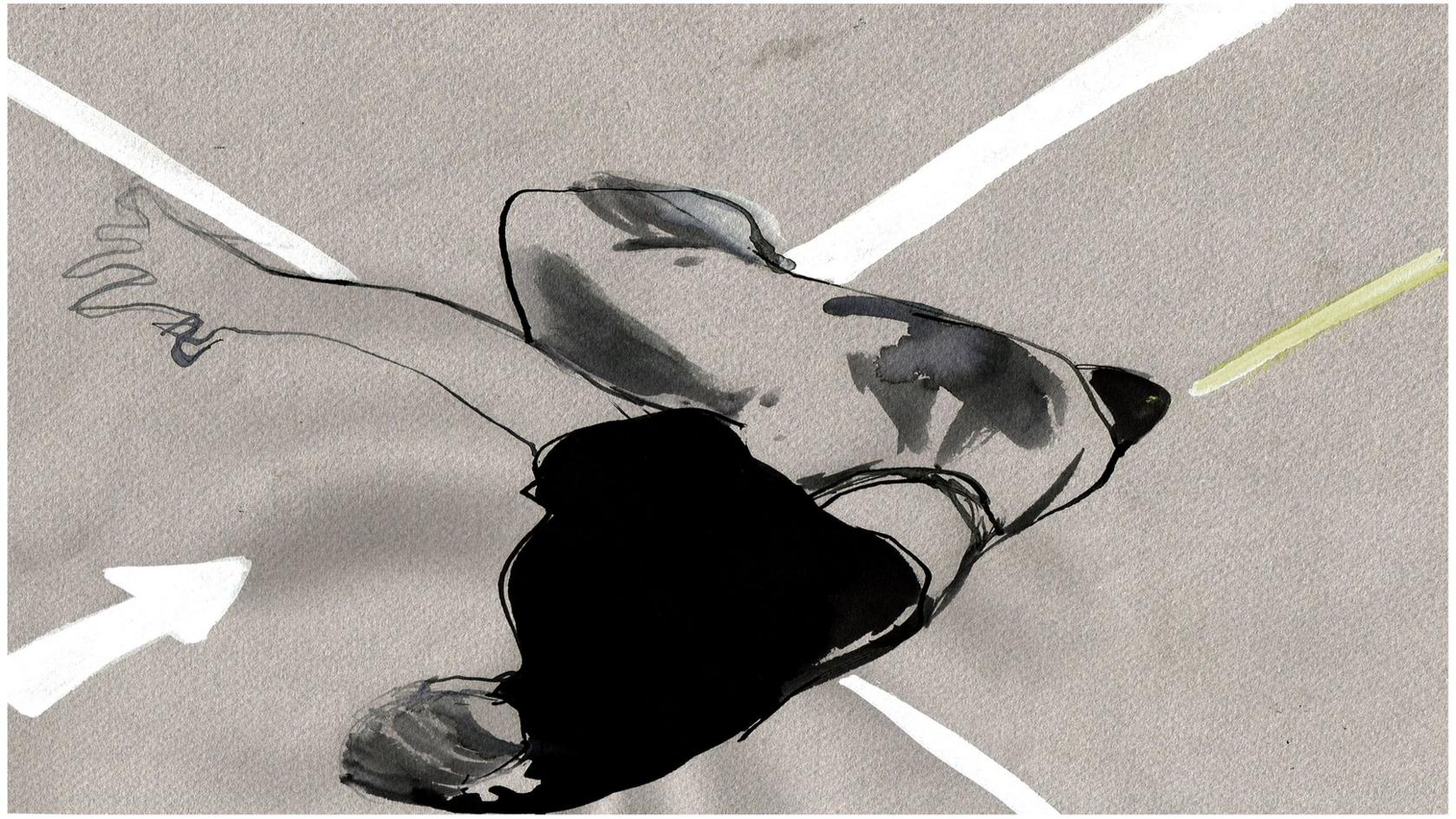
James has come to see Emily, to try and work out what happened.
But Emily is still fizzing with rage.
"He can't just go off, and not come back for a night, and do what he wants to do," she complains. "I'm not being in that situation, in that kind of relationship, where he thinks he can do that."
James slowly teases out the events of the day before. According to Emily, they had an argument about Alex being out of work and he left the house without telling her where he was going. James hasn't heard Alex's side of the story yet, but Emily says he met up with a friend, who persuaded him to go out and get drunk.
"He literally got that smashed, he passed out," she spits out.
"He needs to understand he needs to start bucking his ideas up, and man up, and start being a bit more responsible. I've told him, he does it again, he's out. And I mean it. And he knows it."
The first she saw or heard of him was the following day, outside the meeting with social workers, looking dishevelled.
Emily seems torn between venting her frustrations about Alex, and revealing so much about the state of their relationship that the social workers have second thoughts about their ability to jointly bring up Harry safely.
"I've got too much to lose!" she cries out, at one point.
When James suggests to her that Alex might have been acting abusively towards her, she flies off the handle again.
"Don't start stirring things up James, because that's not what it is," she shouts. "I said he can't treat me like this, meaning he can't bugger off for days. Don't start turning this around, like 'abusive'. Because Alex is not abusive at all. To me."
For several months Emily has been attending a course run by the Hertfordshire Children's Services team, for women who are victims of domestic abuse. The course is designed to help her spot the signs of abuse, such as coercive control.
Alex has also begun a council-run course, for perpetrators of domestic abuse. But he has failed to attend two of the earliest sessions.
"After everything I've been through, losing my children. And he thinks that he can do that when we are under social services," she says.
"Talk about acting like a prat! He could have risked everything. After all the hard work we've done. This is why I'm so angry and so annoyed at him.
"It seems like we move on one step and take two steps back."
14 October 2019 AM
James Shutkever and his manager, Garth Taljaard, are meeting Alex for the first time since last week's row.
For now, Alex has been kicked out and is living with his parents. It's the first time he's been away from his son since he was born.
"I'm a bit upset with myself to be honest," he says.
They're sitting in a council contact centre normally used for parents to have supervised time with their children in care. There are comfy armchairs, a sofa, and children's toys strewn across the room.
Facing James and Garth across a table, Alex looks far from comfortable. Sunlight streams through a window, dazzling him. It looks a bit like an interrogation.
"I want to be with Emily and I want to be with my son, but I've let them down.
"I messed up and that's it. The end of it. I'm not going to do it again. I hold my hands up. I'm going to be a man about it.
"It was bad decision after bad decision. I didn't think about the boy - that's the thing, right. I've got to make it right now. It's my chance to make it right again now."
After a weekend to think about what happened, Alex seems prepared to take the blame, even though he appeared to be the victim in the fight witnessed by social workers. He knows it was his actions - abandoning Emily and getting drunk - that caused the conflict.
And it seems that being separated from Harry has made him realise the impact his actions could have on his relationship with his son. He says he wants to be there for him every day. He doesn't want to be a weekend dad, as he is with his daughter from another relationship.
Garth and James question Alex about his use of alcohol. It has been a frequent source of concern for the social workers, who have to continually evaluate the risk to Harry's safety. But Alex has always resisted.
"I'm not saying you're an alcoholic," Garth says. "I'm saying potentially you have a problematic relationship with alcohol."
Under pressure, for the first time, Alex admits alcohol has led him into fights and even a spell in prison. He promises to talk to a drug and alcohol worker.
"It's not that I've got a problem, it's just like the binge-drinking really..." he says.
But Garth lays it on the line.
"If your drinking was a major problem in the future and you weren't doing anything about it, I wouldn't be hanging around going, 'That's OK,'" he warns.
"Because my job is to challenge you, and it's James' job to challenge you as well. We want the best for you. But ultimately, our agenda is to make sure Harry's safe, loved, and well cared for, and that it's safe for him to be around you."
Garth then says he wants Alex to attend the domestic abuse course regularly - to provide further evidence that Harry will be safe in Alex and Emily's home.
And it seems as though the crisis is forcing a change of heart for Alex. He seems ready to agree to anything. He promises to properly participate in the course.
"Just keep going. That's all I'm asking of you. Just keep going," says Garth.
"I will do, yeah," Alex replies.
"Don't stop going," Garth urges him.
"No I won't," Alex says.
"Because that will worry me…" Garth tells him.
"I'll carry on," Alex says.
After the meeting, James, Garth and I are sitting in the car, reflecting on Alex's promises to change, and Garth says something interesting.
"Families aren't always going to be ideal when we're working with them. Sometimes they're just going to be good enough."
14 October 2019 PM
Later the same day, the team holds a Group Case Supervision meeting. It's a monthly meeting to review progress. But this time it is dominated by the recent events.
Alongside James and Garth are Mandy Smart, who's been leading Emily's course for victims of domestic abuse, and Ayse Insaf, who's running the course Alex is supposed to be attending for perpetrators of domestic abuse.
James discusses the concerns he has about Alex's drinking.
"The worry is that that's what he turned to, to cope with that situation," he says. "And actually, he's in a relationship which might be volatile. How often does that happen?"
"There's been a pattern of him drinking, and then domestic incidents occurring," observes Ayse.
"All the reports mention alcohol, don't they?" Mandy points out.
"It's a potential risk factor-slash-trigger," says Ayse.
Ayse says Alex doesn't seem to understand why he's been asked to attend a course for perpetrators of domestic abuse, because he does not accept that he has been abusing Emily.
Mandy reminds them that last week it was Emily, not Alex, who was the aggressor.
Garth asks everyone to rate the potential risk to Harry on a safety scale of one to 10. One is very high-risk - Garth describes it as "We should really be in court seeking removal of this child." And 10 is low risk - "Why are we involved at all?"
Mandy says: "A couple of weeks ago, I would have put them probably at six or seven, but now I think I'll probably go down to about four."
"OK that's quite a drop," says Garth.
Ayse says she'd score it at five, because it could go either way right now.
James says: "I would have scored much higher, had this recent event not happened and shone some light on what may, or may not, be going on for the family. I think I'd also give them probably a four."
This feels like a big setback for Emily and Alex. There will need to be some serious changes in the next few weeks if they are to convince the social workers that baby Harry is completely safe in their care.
22 November 2019
"I've got your report in front of you, so today I'm just going to go through it. And we've also got James, social worker, present to hear the positive feedback."
Ayse Insaf, who's spent several weeks working intensively with Alex on a course for perpetrators of domestic abuse, is smiling.
They're sitting in the same room at a council contact centre where Alex was being pressurised by James and Garth a few weeks ago. But the atmosphere seems entirely different. It looks as though the strategy may have paid off.
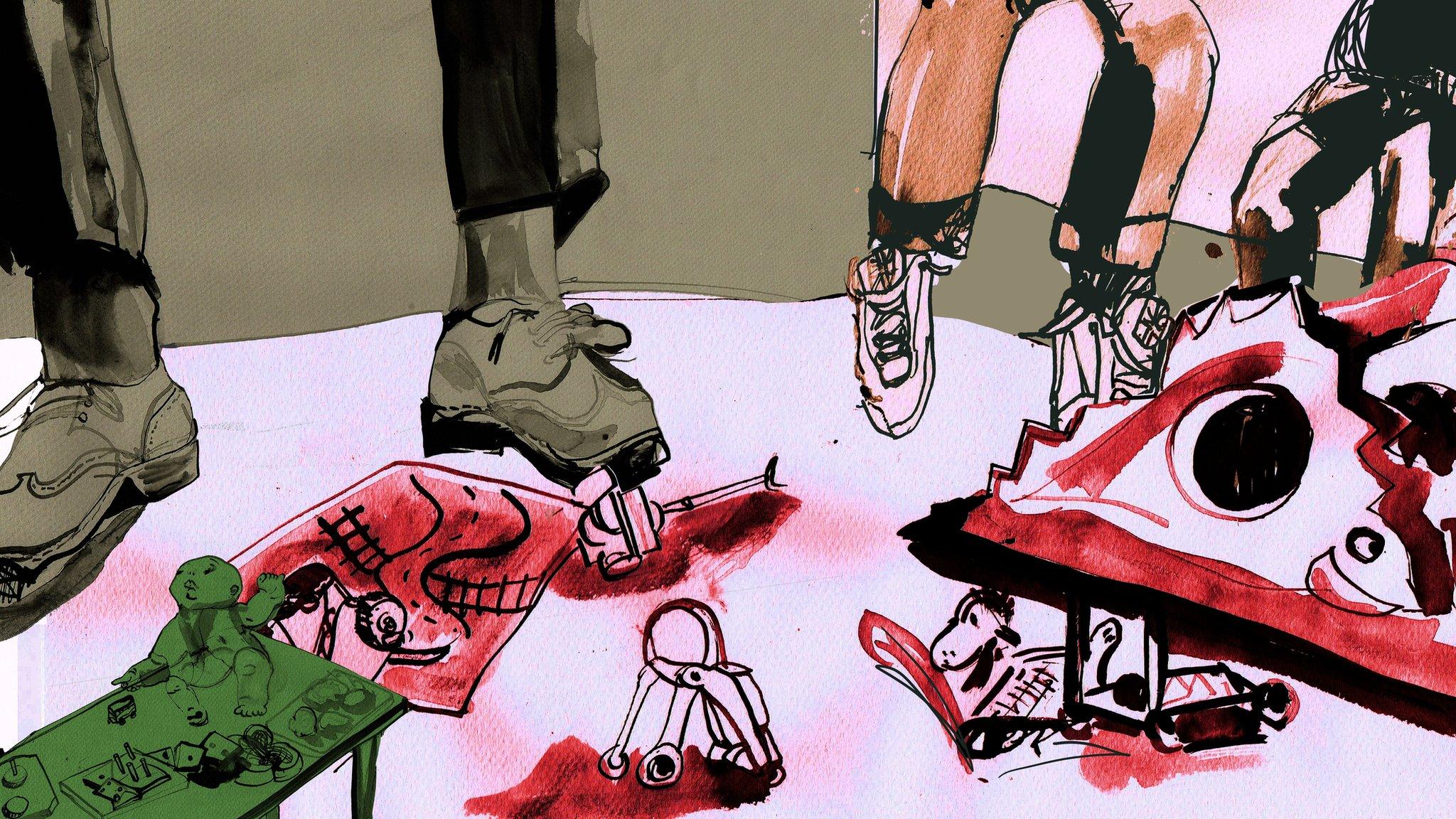
"You've attended 12 sessions out of 14, and missed two," says Ayse.
"We had concerns in the beginning of the programme, but as I said, you've developed your motivation and engagement, so that was really encouraging to see."
Much of the course has involved group work with other men, where they are encouraged to challenge each other's views and behaviour, to re-shape their attitudes to their relationships.
"Since I've done this course I feel a lot better within myself," says Alex
Alex says he's been using some of the techniques he learned, like meditation, to control his temper.
"I've just been taking a step back and thinking, and not just walking out the house, so she doesn't know where I am, which is going to lead to more arguments.
"And if I do go out, I say, 'I'm going to go out for 10 minutes,' and not just slamming the door like I did that time, when I went out."
James says he seems to be showing a lot more awareness now. Alex says it's all been a big learning curve for him.
A few weeks ago Alex did not regard his behaviour as abusive. And even his partner Emily refused to admit it, getting angry with James when he brought the subject up. She was fearful that it would be a black mark against their ability to bring up their baby, and she tried to keep the problem hidden.
Alex seems to be showing some awareness of the impact their arguing and fighting might have been having on their son, even though he is only a baby.
"Instead of me lashing out, I think twice about it, because of what effects it can have on my son," he says.
Ayse picks up the report and reads a section from it, listing all the abusive behaviour Alex admitted to during the course. He nods his head in agreement as she reads.
"So you highlighted using coercion and control, to threaten to leave your partner, using intimidation, making her feel afraid, by using certain looks, actions or gestures, smashing things up and destroying property, emotional abuse, putting her down, making her feel bad about herself, calling her names and playing mind games.
"And you also identified minimising, denying and blaming. So, shifting responsibility of abusive behaviour, saying that she caused it."
James seems genuinely impressed that Alex owned up to all these actions.
"The fact that you're able to list some of these behaviours and actually hold your hands up to it, and say, 'This was me, and I did this, and that was an abusive action towards her,' is actually really big in itself," he says.
"Because I think you know, there's a lot of people who just would not be able to say that. They wouldn't be able to sit there and say, 'I've done all these things.' It's a difficult thing to do."
Alex agrees. "It was hard," he says.
After the meeting I ask Alex why he agreed to do the course in the first place.
"I'll be totally honest with you. It was just like ticking the box and that's the way I looked at it from the start," he says.
"I felt uncomfortable doing it as well. And yeah, I didn't want to be there. That's why I thought it might just go away. But when you've got a child it changes everything. If I didn't have the boy I would never have done this. I would have just swept it under the carpet.
"I wanted to do it for him."
25 November 2019
It's the day of the Child Protection Conference, a formal review meeting, chaired by an independent Child Protection Chair, usually a senior social worker who is not involved in the case.
They are held every six months and a lot is riding on the decision made today. Emily and Alex want the case to be "stepped down" from Child Protection to Child in Need, which means less involvement by the social workers.
Both of them are looking very nervous. They have their baby Harry with them for the conference. He's now six months old.
In this case, the independent chair is Temah Hibbert.
She's writing notes on a row of white boards stuck to the wall. Each board has a heading, drawn up from the Child Protection Plan. The headings are:
What are we worried about?
Impact on child
Strengths
Safety
Complicating factors
Outline Plan
Temah homes in on the fight between Emily and Alex observed by social workers.
"I did wrong, I put my hands up," says Alex.
"You shoved him," Temah says to Emily.
"I did yes," Emily admits. "I shouldn't have done it, but…"
"It's about how you manage these difficult situations, and that was a difficult situation," says Temah.
But Temah is relieved that baby Harry was not there to witness it. Emily says she didn't take him with her because she knew there would be a row if she saw Alex that day.
"Phew," says Temah. "Because in that moment you were keeping Harry safe."
The conference hears from Harry's health visitor, from a child practitioner who's been working with Emily to help stimulate Harry's mental development, and also from the family's tenancy officer. No problems are reported.
Temah questions Alex about the course he's been doing for perpetrators of domestic abuse. Alex says after he got over his reservations about doing it, he enjoyed the course, and found it helpful.
Temah asks all the professionals to make their recommendation about whether it's possible to downgrade this case from Child Protection to Child in Need.
"I feel quite strongly that we can work with you under Child in Need," says Garth.
"There's still work to be done yet. Child in Need doesn't mean we have arrived, it just means we're heading in the right direction. I'm really proud of what you guys are achieving, but there is quite a bit to work through, particularly those grey areas that we need to keep managing. So Child in Need is my opinion."
One by one, each professional agrees with the recommendation.
But the key decision is Temah's.
She also agrees, saying there's no evidence that Harry is suffering, or is likely to suffer, significant harm.
She tells Emily and Alex: "A Child in Need plan is you saying to Children Services, 'Yes we want your support and we're willing to work with you.' Because at any time within that plan, you can say, 'Actually, James, we don't want to have your support any more.' Then there will be a discussion about whether or not they can safely walk away."
But she warns them that although the support is voluntary, it would be a bad idea to reject it, because it would lead to a new appraisal of the likely risk of harm to Harry.
"So the Child Protection Plan is ended today," she says. "Congratulations to you both. Take care, and I wish you all the best."
Emily and Alex look relieved, like a huge weight has been dropped from their shoulders.
"I'm really pleased," says Emily.
"We can move forward and try and live a life without the social involved," says Alex.
"Without so much social involvement," Emily corrects him.
June 2020
It's a sunny day, and Alex and Emily are sitting on a picnic blanket in a park. Harry is cruising around between them, standing up on wobbly legs, trying to grab their drinks from them. They recently celebrated his first birthday.
"He walks when he wants to," says Emily.
Like everyone else under the coronavirus lockdown, the family has been isolated.
It's been difficult for James Shutkever, their social worker, to monitor developments.
"It's the first time we've met up in person for quite a while," says James.
Under lockdown social workers have been avoiding entering their client's homes unless it has seemed urgent.
He's been making video calls to Alex and Emily, and every month or so the team hold a virtual Child in Need meeting with them.
"I can really see the difference in Harry today from when I'm WhatsApping you," says James, "Suddenly he seems like this grown up little boy."
"He's talking a bit now," says Emily.
They chat about their routine under lockdown and how they've only now been able to start visiting Harry's grandparents, who have been shielding.
"That's the worst thing about the lockdown for me," says Alex. "Not seeing anyone."
"And how have the two of you been getting on?" asks James
"All right," says Emily, "But he's been getting on my nerves."
"I always get on your nerves," Alex says.
"It's just living on top of each other," Emily replies.
"Even without lockdown, living in that little flat, it would test any couple," Alex says. "But you know what James, it's not been like it used to be. The arguments we used to have. Even through lockdown it's not like been like that."
"I think we've done all right - we've made the best of a crap situation," Emily says.
"If we can get through this without any issues, then that is a test in its own right," Alex adds.
He qualifies that it's not been all plain sailing, and that they bicker and row like anyone would in the circumstances, but now he's more prepared to talk about his feelings with Emily.
And they both insist that they've learned to be open and honest with James.
"There's no shutter with me any more. There's nothing to hide any more," says Alex.
"It's not like before when we wouldn't tell you anything."
"We're really truthful now," adds Emily.
September 2020
On a computer screen, the future of Emily, Alex, and Harry's family life together - with or without social workers - is being decided. It feels like a very 2020 way to resolve things.
"OK, so this is a Child in Need review," says Garth Taljaard. "James and his team have got to the point where they feel that we can give serious consideration to ending the Child in Need plan. So that's what we're looking at today."
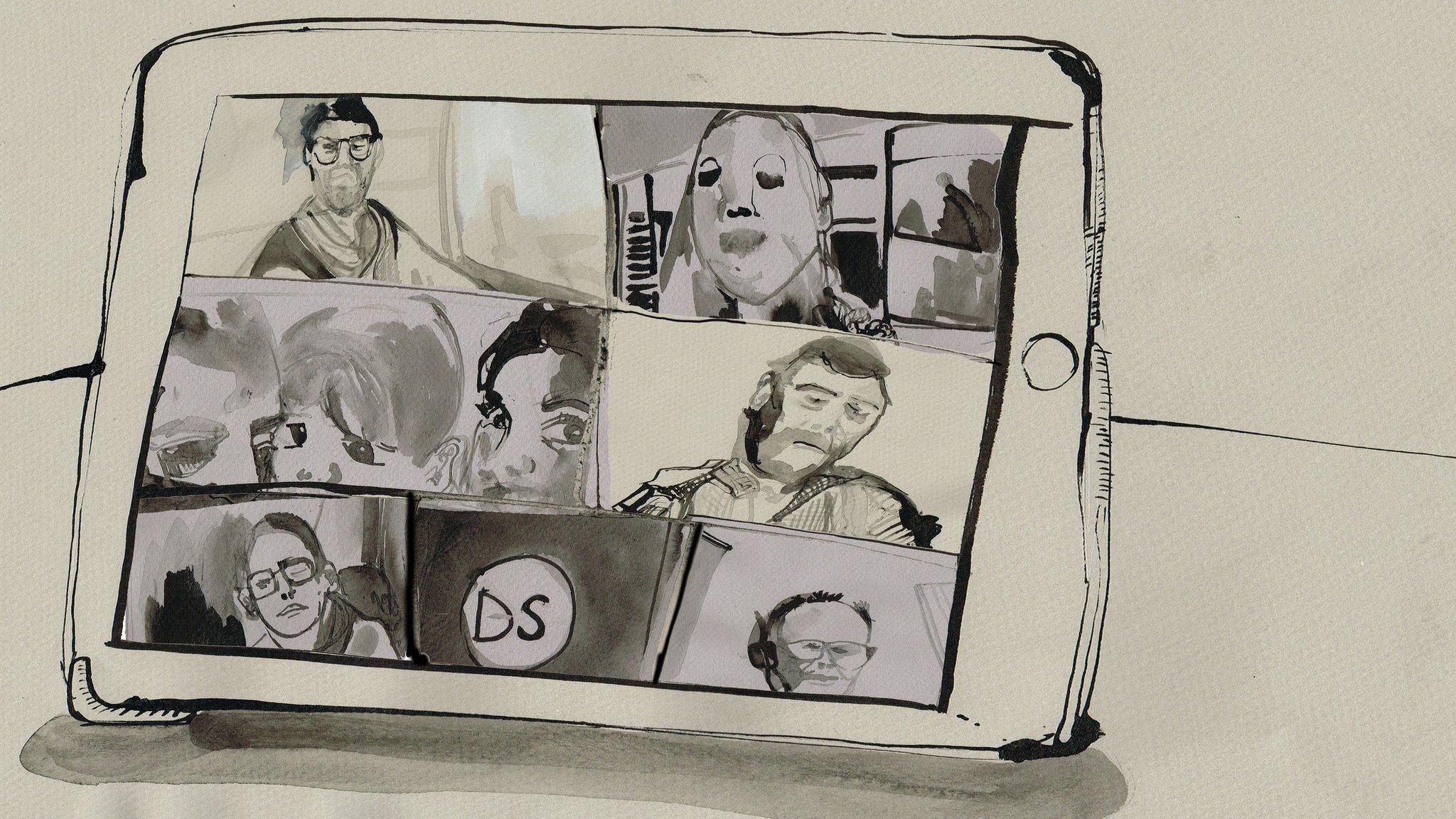
Harry is sitting on Emily's knee in one corner of the video conference screen, with a cheeky grin on his face. Alex is hanging back a little, off camera.
"It's been a very, very long journey. There have been highs and lows, I think," says James. "And I do strongly feel today that the people we are speaking to are really quite different people from the people I met the first time I came round, and introduced myself to the two of you."
Some of the safeguarding team in the meeting add their thoughts on how far Emily and Alex have come.
"Before I really knew you both, I did have real reservations, especially based on the history that I'd seen and read," says Hannah Rogers, their health visitor, recounting how the parents were not open and honest at first.
"I think a lot of that was the fear that if you tell us anything negative, or you tell us anything at all, then we're going to hold it against you, and you are not going to be allowed to take your baby home."
Hannah agrees with James that the couple are now "in a completely different place".
Emily seems a little taken aback, and thanks them for their comments. Then Alex starts speaking.
"I think when we gained trust in you, then we opened up. And once we started being more truthful, I found that we got on so much better with all of you," he says. "It was because of the way Emily was treated by social workers when she had her children removed from her, because she had it bad from them."
At this point Emily makes clear that she still deeply resents the actions of the team of social workers who removed her older children.
Garth continues by proposing that the family should be referred to the council's Families First team, rather than being left to get on with things completely by themselves. This would mean they'd no longer have a social worker, but instead a support worker to help with practical issues such as employment, education and housing.
Alex says he's got a job as a supermarket delivery driver recently, and Emily says she wants support with counselling for her mental health problems caused by the loss of her older children.
"I'm comfortable making the decision, in my capacity as a manager, that we have reached the point where we can end the Child in Need plan," says Garth.
It takes a moment to sink in.
"Brilliant! Thank you very much! Today is a good day," exclaims Emily.
"Thank you to everyone, and to you James," says a delighted Alex.
"Congratulations guys, it is really great to hear," says James.
I ask Emily how she feels. "Relieved," she says. "Finally! All the hard work, it's paid off. And it's been worth it."
Later, after she's had time to consider, she tells me: "I'm proud of ourselves really - to get from where we have come from to where we are now."
And she's grateful for the support they've been given by the family safeguarding team.
"I think both of us, with the work that we've had, has helped us be a lot better parents to Harry, without a doubt," she says.
Emily says her own family is proud of the transformation she's undergone.
"My family even didn't want to get that close to Harry at first, because they didn't know what the outcome was going to be," she says. "But they love him now, and he is adored by all the family, and by Alex's family."
The case has concluded just as James finishes his first full year as a qualified social worker. There will no doubt be many more cases like this one to come.
"I will never forget working with this family," he says.
"I've learned a lot about building relationships with people, and I apply that in my practice every single day now with other families."
The experience has confirmed his belief that with the right help and support, people can change. "It gives me hope for the future," he says.
For Emily and Alex there will be many more challenges as their baby Harry grows older, but now they will face them as a family, without social workers.
Illustrations by Katie Horwich
You may also be interested in:
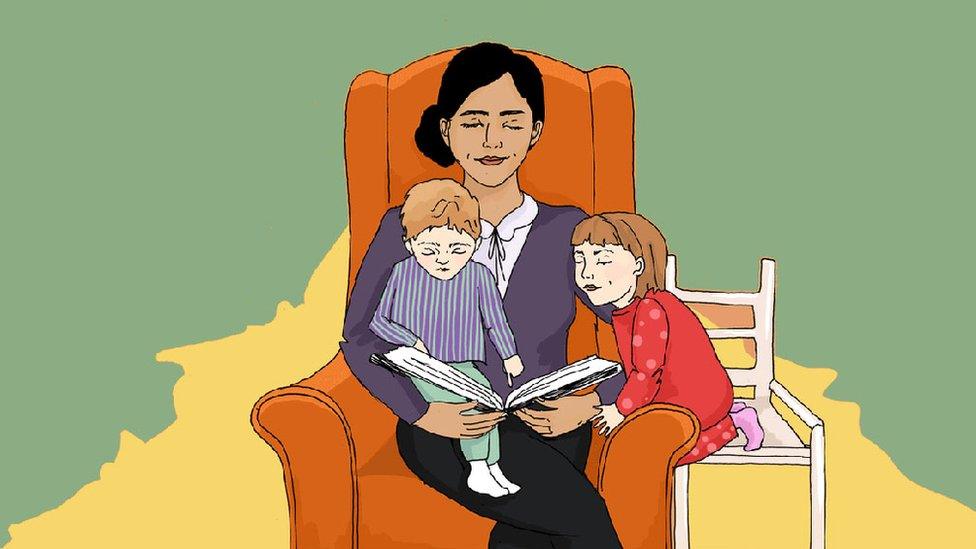
One true story. Two young children. A family is being shattered; can a new one be created? A rare insight into the process of adoption, through the eyes of those affected.